|
|
|
Sort Order |
|
|
|
Items / Page
|
|
|
|
|
|
|
| Srl | Item |
| 1 |
ID:
100150
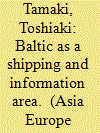

|
|
|
|
|
| Publication |
2010.
|
| Summary/Abstract |
In early modern times, the Netherlands imported grain from the Baltic, especially Poland, and re-exported it elsewhere in Europe. The Dutch shipping industry was extremely profitable, for transport costs were very high, and the number of Dutch ships was by far the largest among the European countries. Dutch prosperity was based on shipping of grain from the Baltic. Amsterdam was also a center of information because it was a port at which many ships stayed, and which attracted various merchants owing to its policy of religious tolerance. Much commercial information and know-how were accumulated in and spread from Amsterdam which contributed to the growth of the regional European economy from the Baltic because many merchants migrated to Northern Europe via the city, bringing with them the latest commercial techniques. Amsterdam therefore served as a core of Baltic integration in the early modern period, for it was a center of shipping and information.
|
|
|
|
|
|
|
|
|
|
|
|
|
|
|
|
| 2 |
ID:
100143
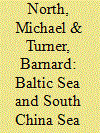

|
|
|
| 3 |
ID:
100148


|
|
|
|
|
| Publication |
2010.
|
| Summary/Abstract |
The ancient Chinese always had a complex psychic relation to the vast ocean: longing, but disdaining. On the one hand, they thought there were elfish hills, immortals, and fairy trees abroad; on the other hand, they viewed overseas residents as strange. Before the fifteenth century, the Chinese people were capable of conducting maritime operations positively and entering into contacting peaceful and friendly contacts with foreign countries, the establishment of Ming Dynasty suppression of the coastal areas and the closed-door policy became its basic national policy. After the failure of the first Opium War, some coastal military officials and intellectual elites took the lead in "seeing the world"; they were cognizant of the superior might of western firepower and claimed that the Chinese should "learn from the 'barbarians' advanced skills to resist their aggression". However, even those provincial magnates who actively advocated coastal defense such as Li Hongzhang and Shen Baozhen also failed to really comprehend the oceans' great economic and military value and separated themselves from the set pattern of the old land-based coastal defense. It was not until the beginning of the twentieth century, with the introduction of A. T. Mahan's Sea Power Theory, that the Chinese people gained a comparatively profound cognition of the importance of protecting national maritime interests. The democratic revolutionist Sun Yat-sen insisted that man should strive for survival and development by means of the oceans. However, at the beginning of the establishment of the People's Republic of China, faced with the economic blockade and political pressure by western powers, the Chinese government still took land development and "coastal security" as the center and neglected the effective management of the maritime territory. Since "reform and opening-up", the second generation of central collective leaders of the Communist Party of China (CPC) with Deng Xiaoping at its core, proposed the coastal strategic concept of "offshore defense" and the principle of "laying sovereignty and jointly exploring" for handling maritime disputes, and the third generation of central collective leaders of CPC with Jiang Zemin, at its core, emphasized a better understanding of the oceans from the height of strategy. Nowadays, under the influence of the increasing emphasis on the oceans all over the world, the voice of the Chinese government and Chinese people to establish a strong naval power has become increasingly stronger, but its action is still impeded by many aspects.
|
|
|
|
|
|
|
|
|
|
|
|
|
|
|
|
| 4 |
ID:
100147


|
|
|
|
|
| Publication |
2010.
|
| Summary/Abstract |
Comparative interregionalism is often limited to the policy or panoramic dimension, reducing local differences and specificities, the "minute particulars" (Blake, William Blake's Writings, 614, 620, 1978) of the lifeworld to their more abstract forms. This is particularly the case when the European Union (EU) and Association of Southeast Asian Nations (ASEAN) are compared: generalities remain abstractions, whereas the sharper the focus the more diffferentiated the mindscape becomes and the more the basis for the comparison is undermined. Yet, in a global knowledge networked economy (to get all the buzzwords in one phrase), comparisons are necessary if often invidious. While commentators are often reluctant to see the EU as a model for ASEAN, it is often seen as a complex of experiences to be shared. Yet what-in this domain-gets exported, transplanted and implanted elsewhere, how does this transference take place in such an internetted society, and to what end? Seen in an interregional, even global context, and including an examination of teaching Günter Grass' Crabwalk (Im Krebsgang, 2002) in English translation to undergraduates of a contemporary European literature class at the National University of Singapore, the paper hopes to indicate some temporal and spatial contexts of transplantation and the means by which this is achieved.
|
|
|
|
|
|
|
|
|
|
|
|
|
|
|
|
| 5 |
ID:
100152
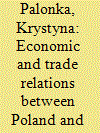

|
|
|
|
|
| Publication |
2010.
|
| Summary/Abstract |
The recent economic recession over much of the developed world may, at least partly, redirect Chinese activity towards regions different from those traditionally at the centre of Chinese interests. One such area is the eastern Baltic, in general, and Poland, in particular, as a large economy in the region. While there have been some political tensions in recent years, this article emphasises that cultural and economic relations have been developing significantly faster in the last few years, with mutual recognition increasing. While, not unexpectedly, there is still an imbalance of the quantity goods traded, and of a divergence in the categories of such goods, there are good reasons for optimism as recent high-level visits between both countries have shown. Looking at such factors as foreign direct investment growth and stimulus packages, this short descriptive, rather than analytical overview, presents a case for an optimistic scenario even if it does indicate a background of some uncertainty in the global context impacting upon growth of relations between the two countries.
|
|
|
|
|
|
|
|
|
|
|
|
|
|
|
|
| 6 |
ID:
100155


|
|
|
|
|
| Publication |
2010.
|
| Summary/Abstract |
China and some ASEAN countries are emerging economies. As their population and economies grow at a rapid pace, energy security and related environmental problems remain a big concern. This paper tries to address some interrelated topics: what are China and ASEAN countries' energy status and concerns, and what strategies and approaches have these countries taken to enhance their energy security? Since the South China Sea is vital to the economic prosperity of China and ASEAN countries in terms of energy transportation sea lanes and is believed to contain significant oil and natural gas, how will these countries react, in rivalry or cooperation, for energy exploration there?
|
|
|
|
|
|
|
|
|
|
|
|
|
|
|
|
| 7 |
ID:
100151
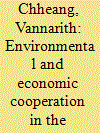

|
|
|
|
|
| Publication |
2010.
|
| Summary/Abstract |
Greater Mekong Subregional Integration has been promoted quite remarkably in the past decade with the support from key international and regional actors. Hard and soft infrastructure has been developed extensively. The road connection development in the Greater Mekong Subregion under the framework of East-West Corridor and North-South Corridor encourages more human and goods exchanges. The policy coordination and harmonization among the countries in the region have been upgraded but at a very slow pace. The future of the regional integration in the region is realizable through hard and soft infrastructure integration. As this article attempts to demonstrate, the main concern, though, still surrounds the issue of political willingness and real cooperation.
|
|
|
|
|
|
|
|
|
|
|
|
|
|
|
|
| 8 |
ID:
100153
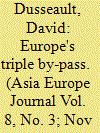

|
|
|
|
|
| Publication |
2010.
|
| Summary/Abstract |
Periodic contestations over gas transit from Russia westwards to Europe, as in January 2009, have demonstrated the fractured nature of relations among states that each on their own plays a vital role in the maintenance of the European energy sector. More importantly, the January crisis has reinforced the concept that energy security goes beyond existing conceptions of access to upstream supply balanced by consumer demand. Up to now, the track record along the European energy value chain has prioritised short-term macro-solutions over longer term, step by step confidence building micro approaches. What becomes of energy trade in Europe may depend upon a fundamental re-thinking of energy based both on the understanding of the good as a purely economic commodity and on our institutional ability to coordinate the energy trade as a collective across a vast landscape of divergent economic and political interests. Subsequently, this article seeks to identify the sources of inaccurate structural interpretations of the policy environment, the unintended consequences derived from sub-optimal policy choices and to present workable solutions to existing risks to the stability of EU/Russia energy trade.
|
|
|
|
|
|
|
|
|
|
|
|
|
|
|
|
| 9 |
ID:
100145


|
|
|
|
|
| Publication |
2010.
|
| Summary/Abstract |
The aim of this article is to elaborate one aspect of post-socialist memory culture in one Baltic state, namely, which meaning is given to the late socialist period (1960–80) in Estonians’ personal narratives. Reminiscing about events of twentieth century has a meaningful place in the integration of the Baltic Sea region in the twenty-first century. The tensions between memory politics and personal experiences expressed in biographical accounts will also be explored. In the 1990s, late socialism was understood in Estonians’ cultural memory as part of a discontinuity discourse. In the early twenty-first century, the same period is understood more along the lines of a paradigm of everyday life.
|
|
|
|
|
|
|
|
|
|
|
|
|
|
|
|
| 10 |
ID:
100149
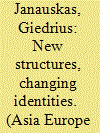

|
|
|
|
|
| Publication |
2010.
|
| Summary/Abstract |
The accession of Estonia, Latvia, Lithuania, Poland to the European Union (EU) has led to an increase in initiatives on Baltic Sea issues and a degree of enhanced confidence in moving towards solutions. While EU policies and instruments, and the provision of significant financial resources, have increased, one might still ask whether people across the Baltic Sea region are ready for the changes implied by the new Baltic strategy and comparable initiatives. Marko Lehti and David Smith have "tried to show that national thinking is by no means self-evident and that the Baltic can be comprehended as a trans-national space". Yet, how this position is articulated in the various societies warrants close investigation. This position is closely related to dominant identities and images within Baltic societies. How will the EU's innovative strategy and the resulting change of images impact upon the conceptual understandings of the Baltic Sea and region, including perhaps the search for a common identity as a successful and a pilot scheme?
|
|
|
|
|
|
|
|
|
|
|
|
|
|
|
|
| 11 |
ID:
100146


|
|
|
|
|
| Publication |
2010.
|
| Summary/Abstract |
This article asks how we can understand processes of regional integration through the lens of memory. Regional integration, despite its taking place in the here and now, rests on acts of cultural recall. Socially shared versions of history, concepts of identity, values and norms, stereotypes, and prejudices as well as certain modes of behavior are usually formed in long historical processes and become part of a "cultural memory." Cultural memory is one of the "soft factors" which are inevitably at work in the negotiation of economical questions, energy and power politics-the "hard factors" of regional integration, as it were. It can affect the way in which processes of regional integration function, or fail to do so. And it often does so in ways that social groups are not even conscious of. The article will present theories of cultural memory put forward by Maurice Halbwachs, Pierre Nora, and Aleida and Jan Assmann as well as recent trends in research on "transcultural memory" and ask about their implications for the study of regional integration.
|
|
|
|
|
|
|
|
|
|
|
|
|
|
|
|
| 12 |
ID:
100154
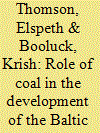

|
|
|
|
|
| Publication |
2010.
|
| Summary/Abstract |
Compared to other energy sources, coal is typically regarded as dirty and inefficient. To many, it conjures images of the Industrial Revolution, steam ships, steam trains, appalling working conditions and loss of life in the mines, thick air and gritty eyes and noses in the western metropolises. In the Baltic Region, the use of coal is declining everywhere but Russia. These generally mature economies are successfully shifting to cleaner fuels. However, as much of the South China Sea region is in the midst of economic take-off and modernization, coal consumption is on the rise. The demand for electric power is soaring and coal seems to be the only way to produce the vast amounts of electricity required. This paper examines the production of coal within the South China Sea region and the shared need to attempt to minimise the carbon emissions resulting from the use of so much coal.
|
|
|
|
|
|
|
|
|
|
|
|
|
|
|
|
| 13 |
ID:
100156
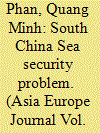

|
|
|
|
|
| Publication |
2010.
|
| Summary/Abstract |
The year 2009 marked many dynamic developments in the South China Sea which attracted the attention of the international community. The main objective of this paper is to analyze these recent security developments by examining the following questions: why tensions are rising in the South China Sea, how challenging is the problem, and what can be done to promote regional cooperation among the countries involved? The paper argues that in order to preserve regional stability, a comprehensive approach must be developed, beginning with confidence-building measures through cooperation in solving non-traditional security problems.
|
|
|
|
|
|
|
|
|
|
|
|
|
|
|
|
| 14 |
ID:
100144


|
|
|
|
|
|
|
|